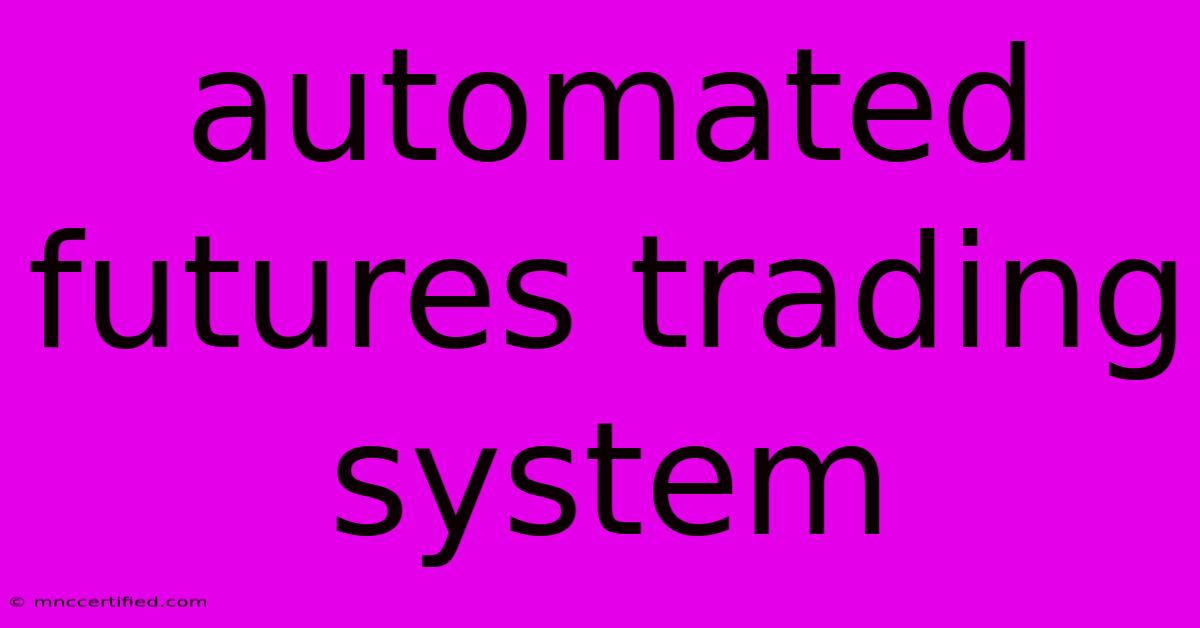Automated Futures Trading System

Table of Contents
Automated Futures Trading System: A Deep Dive into Algorithmic Trading
The world of futures trading has undergone a dramatic transformation with the advent of automated futures trading systems. These sophisticated systems, also known as algorithmic trading systems or automated trading robots, leverage advanced algorithms and software to execute trades automatically, eliminating the need for manual intervention. This article delves into the intricacies of these systems, exploring their benefits, drawbacks, and crucial considerations for those looking to implement them.
What is an Automated Futures Trading System?
An automated futures trading system is a computer program designed to analyze market data, identify trading opportunities, and execute trades based on pre-defined rules and algorithms. These systems can range from simple strategies based on technical indicators to complex artificial intelligence (AI)-powered models capable of adapting to changing market conditions. Key components include:
- Data Feed: A reliable source of real-time market data, crucial for accurate analysis.
- Trading Algorithm: The core of the system, defining the logic for identifying and executing trades. This could be based on technical analysis, fundamental analysis, or a combination of both.
- Backtesting Engine: A tool to simulate the performance of the algorithm on historical data, allowing for optimization and risk assessment.
- Order Management System (OMS): Handles the execution of trades, managing orders and ensuring efficient interaction with the brokerage platform.
- Risk Management Module: Crucial for controlling potential losses and protecting capital. This usually involves setting stop-loss orders and position sizing rules.
Benefits of Automated Futures Trading
The advantages of implementing an automated futures trading system are substantial:
- Speed and Efficiency: Algorithms execute trades much faster than humans, capitalizing on fleeting market opportunities.
- Reduced Emotional Bias: Automated systems are devoid of emotions, preventing impulsive decisions driven by fear or greed.
- Consistency: They follow pre-defined rules consistently, eliminating inconsistencies in trading strategies.
- Scalability: Automated systems can manage a large number of trades simultaneously, increasing trading volume and potential profits.
- Backtesting Capabilities: Thorough backtesting allows for optimization and risk assessment before real-money trading.
Drawbacks and Risks of Automated Futures Trading
While offering significant advantages, automated futures trading is not without its risks:
- Development Costs: Building and maintaining a robust automated system can be expensive, requiring specialized skills and software.
- Algorithm Dependence: The system's success hinges entirely on the effectiveness of its underlying algorithm. A flawed algorithm can lead to significant losses.
- Market Volatility: Unexpected market events can render even the most sophisticated algorithms ineffective.
- Technical Glitches: System malfunctions or software errors can disrupt trading and lead to missed opportunities or losses.
- Over-optimization: Overfitting an algorithm to historical data can lead to poor performance in live trading.
Choosing the Right Automated Futures Trading System
Selecting the right system requires careful consideration:
- Define Your Trading Strategy: Clearly define your trading goals, risk tolerance, and preferred trading style before selecting or building a system.
- Evaluate the Algorithm: Thoroughly backtest any algorithm on extensive historical data, considering various market conditions.
- Choose a Reliable Broker: Select a broker that offers robust API access and reliable execution capabilities.
- Prioritize Risk Management: Implement strong risk management features to protect your capital.
- Monitor Performance Regularly: Continuously monitor the system's performance and make adjustments as needed.
Building vs. Buying an Automated Futures Trading System
Traders face a crucial decision: build their own system or buy a pre-built one. Building offers customization but demands programming skills and significant time investment. Buying a pre-built system offers convenience but might lack the flexibility of a custom-built solution. The best choice depends on individual skills, resources, and trading goals.
Conclusion: Navigating the Automated Futures Landscape
Automated futures trading systems offer a powerful tool for traders seeking efficiency, consistency, and scalability. However, understanding the associated risks and carefully evaluating the chosen system are crucial for success. Thorough research, meticulous backtesting, and robust risk management are essential components of a successful automated futures trading strategy. The future of futures trading increasingly lies in automation, but informed decision-making remains paramount.

Thank you for visiting our website wich cover about Automated Futures Trading System. We hope the information provided has been useful to you. Feel free to contact us if you have any questions or need further assistance. See you next time and dont miss to bookmark.
Featured Posts
-
Julian Lewis Colorado Commitment Stats
Nov 22, 2024
-
India Vs Australia Test Live Stream Details
Nov 22, 2024
-
What Is Velocity Investments Llc
Nov 22, 2024
-
Coleen And Waynes Public Disputes
Nov 22, 2024
-
Rooneys Post I M A Celeb Appearance Fatherly Focus
Nov 22, 2024